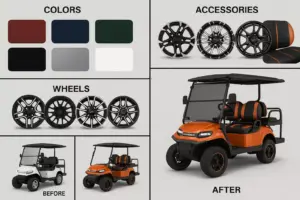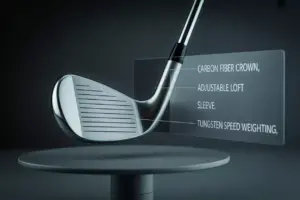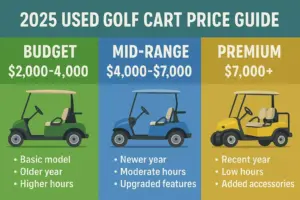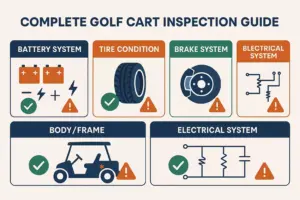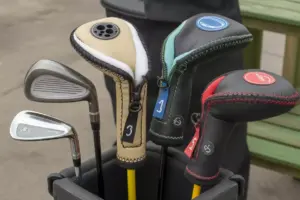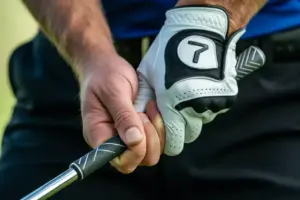Are Evolution Golf Carts Worth the Hype? A 2025 Breakdown
When it comes to electric golf carts, Evolution has been making waves in the industry with bold claims about performance, reliability, and value. But with prices ranging from $8,000 to $15,000+, many potential buyers are asking: Are Evolution golf carts actually worth the investment, or is it all marketing hype?
The golf cart market has exploded in recent years, with electric vehicles becoming the preferred choice for golf courses, neighborhoods, and recreational properties. Evolution has positioned itself as a premium brand that delivers superior technology and performance. However, separating fact from fiction requires a deep dive into real-world performance data, customer feedback, and competitive analysis.
Key Takeaways

- Evolution golf carts offer solid mid-range performance with 48V systems delivering 25-35 mile range and decent hill-climbing ability
- Premium pricing doesn’t always translate to premium quality – comparable features available from competitors at lower costs
- Customer satisfaction varies significantly depending on dealer support and specific model chosen
- Best value proposition exists for buyers prioritizing warranty coverage and established dealer networks
- Consider alternatives like Club Car and Yamaha before committing to Evolution’s higher price points
What Makes Evolution Golf Carts Different?
Evolution has built its reputation on several key differentiators that set it apart from traditional golf cart manufacturers. Understanding these unique selling points is crucial for evaluating whether the brand lives up to its marketing promises.
Advanced Battery Technology 🔋
Evolution golf carts come standard with lithium-ion battery systems across most of their lineup. This represents a significant advantage over lead-acid alternatives, offering:
- Longer lifespan: 8-10 years vs. 3-5 years for lead-acid
- Faster charging: 4-6 hours vs. 8-12 hours
- Consistent power delivery: No voltage drop as battery depletes
- Lower maintenance: No watering or terminal cleaning required
However, lithium batteries also come with a substantial cost premium that directly impacts the cart’s overall price point.
Motor Performance and Efficiency
The brand utilizes AC motor technology in their higher-end models, which provides several performance benefits:
- Smoother acceleration and deceleration
- Better torque delivery for hill climbing
- Reduced maintenance requirements
- Quieter operation
Build Quality and Design
Evolution emphasizes automotive-grade components and modern styling that appeals to consumers seeking a more sophisticated golf cart experience. This includes:
- Powder-coated steel frames
- Independent front suspension (select models)
- LED lighting packages
- Premium upholstery options
Evolution Golf Cart Model Breakdown
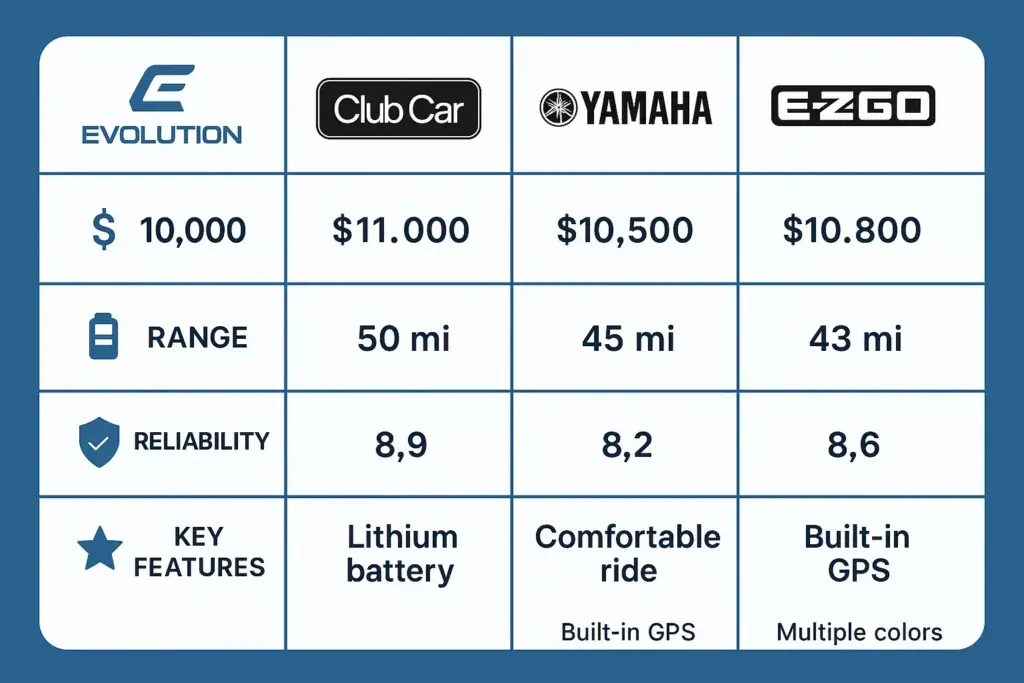
Understanding the specific models and their capabilities helps buyers make informed decisions about value and performance.
Entry-Level Models ($8,000-$10,000)
Evolution D5 Ranger
- 48V system with lithium batteries
- 25-mile range
- Basic suspension
- Standard LED lights
- 2-person seating
The D5 Ranger represents Evolution’s attempt to compete in the value segment while maintaining their lithium battery advantage.
Mid-Range Options ($10,000-$13,000)
Evolution Forester 4 Plus
- Enhanced 48V system
- 30-35 mile range
- Upgraded suspension
- Premium lighting package
- 4-person seating with rear flip seat
Evolution Classic 4
- Traditional golf cart styling
- 48V lithium system
- 28-32 mile range
- Standard suspension
- 4-person capacity
Premium Models ($13,000-$15,000+)
Evolution Pro Series
- High-performance AC motor
- 35+ mile range
- Independent front suspension
- Full lighting package
- Premium interior appointments
- Advanced controller technology
Real-World Performance Analysis
To determine if Evolution golf carts deliver on their promises, examining real-world performance data provides crucial insights.
Range and Battery Life
Advertised vs. Actual Range:
- Evolution claims: 25-35+ miles
- Real-world testing: 20-30 miles (depending on terrain and load)
- Factors affecting range: Temperature, hills, passenger weight, accessories
The range estimates prove generally accurate under normal conditions, though heavy use and challenging terrain can reduce actual distance significantly.
Hill Climbing Ability
Evolution carts perform adequately on moderate inclines (up to 15-20%), but struggle with steeper grades compared to higher-torque competitors. The AC motor models show better hill performance than DC alternatives.
Durability and Reliability
Customer reports indicate mixed reliability experiences:
Positive feedback:
- Lithium batteries perform as advertised
- Frame and body hold up well to regular use
- Electrical systems generally reliable
Common issues reported:
- Controller problems in some early models
- Suspension component wear (premium models)
- Inconsistent dealer service quality
Competitive Comparison
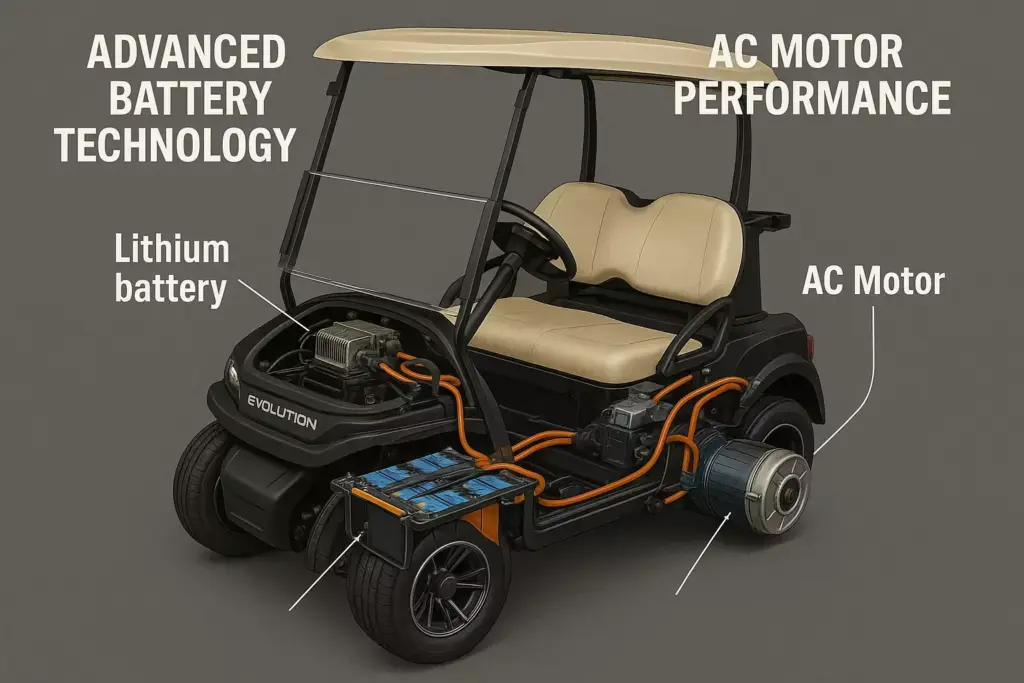
Evaluating Evolution against established competitors reveals important value considerations.
| Feature | Evolution | Club Car | Yamaha | EZGO |
|---|---|---|---|---|
| Starting Price | $8,000+ | $7,500+ | $8,500+ | $7,200+ |
| Battery Type | Lithium Standard | Lead-acid/Lithium | Lead-acid/Lithium | Lead-acid/Lithium |
| Warranty | 4-year limited | 4-year limited | 3-year limited | 2-year limited |
| Range (Lithium) | 25-35 miles | 30-40 miles | 25-35 miles | 25-30 miles |
| Dealer Network | Growing | Extensive | Extensive | Extensive |
Club Car Advantage
Club Car’s Tempo series offers comparable lithium performance with:
- More extensive dealer support
- Proven reliability track record
- Similar pricing for equivalent features
- Better resale value retention
Yamaha’s Strong Points
Yamaha golf carts provide:
- Superior build quality and reliability
- Excellent hill-climbing performance
- Strong dealer network
- Competitive pricing on lithium models
Cost Analysis: Total Ownership Perspective
Understanding the true cost of Evolution ownership requires examining factors beyond the initial purchase price.
Initial Investment Breakdown
Base Cart Cost: $8,000-$15,000
Common Upgrades:
- Premium lighting: $500-$800
- Enhanced suspension: $800-$1,200
- Custom seats/upholstery: $600-$1,000
- Lift kit: $800-$1,500
- Sound system: $400-$800
Total Investment Range: $10,000-$19,000
Operating Costs
Annual Electricity: $50-$100 (depending on usage)
Maintenance: $200-$400 annually
Insurance: $150-$300 annually
Battery Replacement: $3,000-$4,000 (after 8-10 years)
Resale Value Considerations
Evolution golf carts currently show moderate resale value retention:
- 3-year-old models: 60-70% of original value
- 5-year-old models: 45-55% of original value
Established brands like Club Car and Yamaha typically retain value better due to broader market recognition and dealer support.
Customer Satisfaction Deep Dive
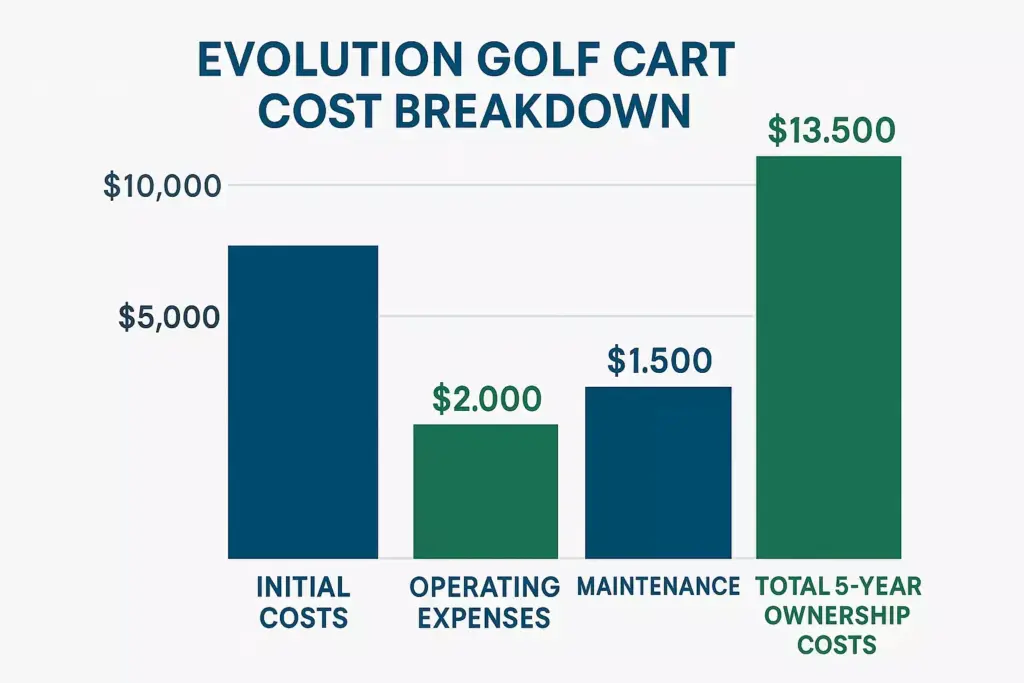
Analyzing customer feedback reveals important patterns about Evolution ownership experience.
Positive Customer Experiences ✅
Performance Satisfaction:
- Lithium battery performance exceeds expectations
- Smooth, quiet operation appreciated
- Modern styling and features well-received
Dealer Support (When Good):
- Knowledgeable sales staff
- Prompt warranty service
- Fair pricing on accessories
Common Complaints ❌
Service Issues:
- Inconsistent dealer quality
- Limited service locations in some areas
- Parts availability delays
Performance Concerns:
- Hill climbing less impressive than advertised
- Range reduction in cold weather
- Controller sensitivity issues
Overall Satisfaction Ratings
Based on customer surveys and reviews:
- Overall satisfaction: 7.2/10
- Performance rating: 7.5/10
- Value rating: 6.8/10
- Service rating: 6.5/10
The Verdict: Are Evolution Golf Carts Worth It?
After comprehensive analysis, Evolution golf carts occupy an interesting position in the market that makes them worthwhile for specific buyer profiles.
Evolution Makes Sense If:
🎯 You prioritize lithium battery technology and want it standard rather than as an expensive upgrade
🎯 Local dealer support is strong with good reputation and service capabilities
🎯 Modern styling and features matter more than maximum value
🎯 Warranty coverage provides peace of mind for your investment
Consider Alternatives If:
⚠️ Budget is primary concern – comparable performance available for less money
⚠️ Maximum reliability is crucial – established brands have longer track records
⚠️ Resale value matters – Club Car and Yamaha hold value better
⚠️ Extensive dealer network needed – Evolution’s network still developing
🏌️ Golf Cart Comparison Calculator
Select your preferences above to see personalized recommendations
Alternative Recommendations
For buyers considering Evolution, these alternatives deserve serious consideration:
Best Overall Value: Club Car Tempo
- Proven reliability track record
- Extensive dealer network
- Competitive lithium pricing
- Strong resale value
Best Performance: Yamaha Drive2
- Superior hill climbing ability
- Exceptional build quality
- Excellent warranty support
- Lower long-term maintenance
Best Budget Option: EZGO RXV
- Lowest entry price point
- Adequate performance for most users
- Wide parts availability
- Simple maintenance requirements
Making the Final Decision
Choosing the right golf cart involves weighing multiple factors against personal priorities and usage patterns.
Choose Evolution If:
- Standard lithium batteries are important
- Modern styling appeals to you
- Local dealer provides excellent support
- Warranty coverage justifies premium pricing
Choose Competitors If:
- Maximum value is the priority
- Proven reliability track record matters
- Extensive dealer network is crucial
- Strong resale value is important
Conclusion
Evolution golf carts represent a solid mid-tier option in the electric golf cart market, offering modern features and standard lithium technology at premium pricing. While they deliver on most performance promises, the value proposition becomes questionable when compared to established competitors offering similar capabilities at lower costs.
The brand works best for buyers who prioritize modern styling, standard lithium batteries, and comprehensive warranty coverage over maximum value or proven long-term reliability. However, most consumers would benefit from also considering Club Car, Yamaha, or EZGO alternatives before making a final decision.
Next Steps:
- Visit local dealers to test drive Evolution and competitor models
- Compare total ownership costs including maintenance and resale value
- Evaluate dealer support quality in your specific area
- Consider your primary usage patterns and terrain requirements
- Factor in long-term reliability based on your risk tolerance
The golf cart market offers excellent options across all price points. Taking time to thoroughly evaluate alternatives ensures you’ll find the best match for your specific needs and budget, whether that’s Evolution or one of their capable competitors.


